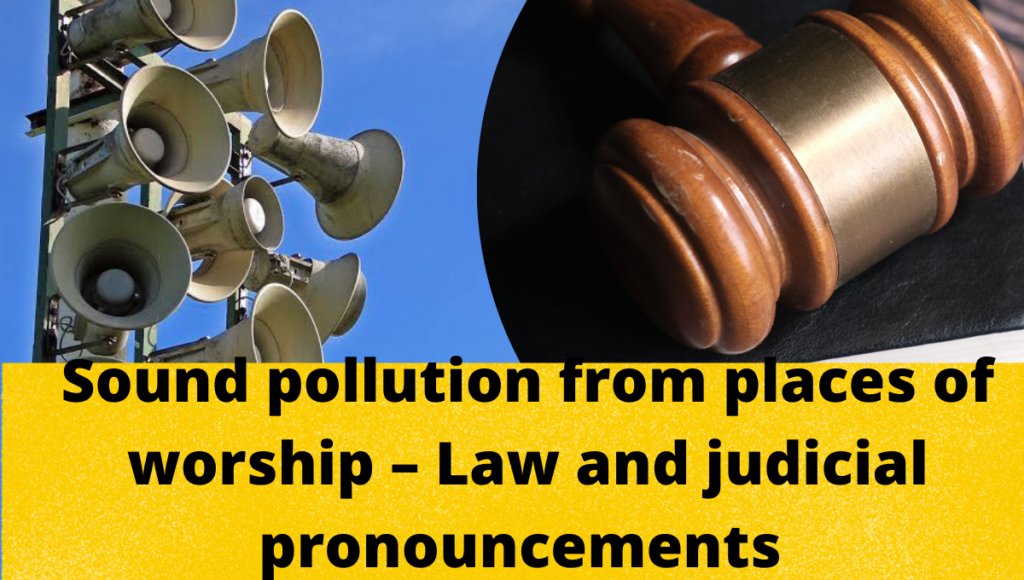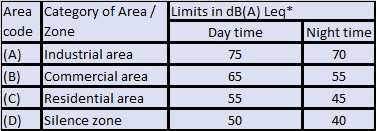
In recent times the issue of sound pollution emanating from places of worship has caught the attention of the entire country and a serious debate is going on both in mainstream media and on social media platforms.
The problem of sound pollution was taken cognisance of in the year 2000 when the THE NOISE POLLUTION (REGULATION AND CONTROL) RULES, 2000 were notified. These rules were amended from time to time. The last major amendment being done in 2010. These rules have been formulated under the Environment (Protection) Act, 1986.
The rationale for framing of noise pollution rules were explained as under:
“Whereas the increasing ambient noise levels in public places from various sources, inter-alia, industrial activity, construction activity, fire crackers, sound producing instruments, generator sets, loud speakers, public address systems, music systems, vehicular horns and other mechanical devices have deleterious effects on human health and the psychological wellbeing of the people; it is considered necessary to regulate and control noise producing and generating sources with the objective of maintaining the ambient air quality standards in respect of noise”
While the rules framed for regulation and control of noise pollution covered every conceivable type of noise, sound pollution emanating from religious places has been a controversial and hotly debated issue since last two decades. The first judicial pronouncement on this issue came in 1996 when the Calcutta High Court had in a judgement on the issue of permission for use of loudspeakers held that:
- Freedom of speech and expression guaranteed under Article 19(1)(a) of the Constitution of India includes, by necessary implication, freedom not to listen and/or to remain silent. One cannot exercise his right at the cost and in total deprivation of others’ rights. A right cannot be conferred by the authorities concerned upon a person or a religious organization to exercise their rights suspending and/or taking away the rights of others.
- It cannot be said that the religious teachers or the spiritual leaders who had laid down these tenets, had any way desired the use of microphones as a means of performance of religion.
- Undoubtedly, one can practise, profess and propagate religion, as guaranteed under Article 25(1) of the Constitution, but that is not an absolute right. The provisions of Article 25 is subject to the provisions of Article 19(1)(a) of the Constitution. On true and proper construction of the provisions of Article 25(1), read with Article 19(1)(a) of the Constitution, it cannot be said that a citizen should be coerced to hear anything which he does not like or which he does not require.
- Pollution is a factor which has now a prime importance in the modern society. The effect of sound on human bodies is very serious.
The above points were taken into consideration by Supreme Court of India in 2000 when the honourable court pronounced its verdict in the case of Church of God (Full Gospel) in India v. K.K.R. Majestic Colony Welfare Assn., (2000) 7 SCC 282. The court observed that:
‘Undisputedly, no religion prescribes that prayers should be performed by disturbing the peace of others nor does it preach that they should be through voice amplifiers or beating of drums. In our view, in a civilized society in the name of religion, activities which disturb old or infirm persons, students or children having their sleep in the early hours or during daytime or other persons carrying on other activities cannot be permitted ‘
‘We would mention that even though the Rules are unambiguous, there is lack of awareness among the citizens as well as the Implementation Authorities about the Rules or its duty to implement the same. Noise polluting activities which are rampant and yet for one reason or the other, the aforesaid Rules or the rules framed under various State Police Acts are not enforced’
Through various verdicts, courts across India have upheld the THE NOISE POLLUTION (REGULATION AND CONTROL) RULES, 2000 and called upon the authorities to strictly enforce the above rules. In particular, courts have consistently upheld that the fundamental right to life as guaranteed by the Constitution of India under Article 21 includes right to peaceful and pollution free life. Noise pollution beyond permissible limits is an inroad into peaceful enjoyment of right to life. In October, 2021, the Madras High Court in its judgement observed as under:
‘No person can be allowed to commit any illegality merely on the ground of sentiments of the people or under the guise of religious rights, any such sentiments leading to illegality can never be tolerated by the State and its Authorities. Any leniency would lead to infringement of fundamental rights of the other citizen and therefore, the State is duty bound to ensure that all such religious rights are being exercised by any citizen in the manner contemplated and to the extent permissible under the Constitution of India. Merely by creating sentiments in the public or in any religious places, no person can be allowed to carry on any such illegal activities or otherwise’
In the states of Andhra Pradesh and Telangana, above rules have been notified through a G.O. issued by ENVIRONMENT, FORESTS, SCIENCE & TECHNOLOGY (ENV) DEPARTMENT (G.O.Ms.No. 172
Dated: 12-10-2010. The salient features of the rules are:
- A loud speaker or a public address system shall not be used except after obtaining written permission from the authority.
- A loud speaker or a public address system or any sound producing instrument or a musical instrument or a sound amplifier shall not be used at night time except in closed premises for communication within, like auditoria, conference rooms, community halls, banquet halls or during a public emergency
- “Night time” means the period between 10.00 p.m. and 6.00 a.m.
- The noise level at the boundary of the public place, where loudspeaker or public address system or any other noise source is being used shall not exceed 10 dB (A) above the ambient noise standards for the area or 75 dB (A) whichever is lower;
- The peripheral noise level of a privately owned sound system or a sound producing instrument shall not, at the boundary of the private place, exceed by more than 5 dB (A) the ambient noise standards specified for the area in which it is used.
- The audio systems of vehicles shall not be heard more than 7 meters away from the vehicles.
- The Ambient Air Quality Standards in respect of Noise as per the Notification cited are as follows:

Note: –
1. Day time shall mean from 6.00 a.m. to 10.00 p.m.
2. Night time shall mean from 10.00 p.m. to 6.00 a.m.
3. Silence zone is defined as an area comprising not less than 100 meters around hospitals, educational institutions and courts. The silence zones are zones, which are declared as such by the competent authority, i.e. Town Planning Department.
8. PENALTIES:
i) LEVY OF PENALTIES: The Penalties will be, in accordance with the provisions laid down in Police Act, Cr.P.C. and Motor Vehicles Act, in addition to the provisions in Section 15 of Environment (Protection) Act, 1986. Accordingly, for vehicular defaulters, the Section 190(2) of Motor Vehicles Act, 1988 is used to fine the first offence at Rs.1,000/- and subsequent offences at Rs.2,000/- per offence. For the subsequent offences, the vehicle mounted audio system and accessories shall be removed and confiscated in addition to other penalties.
ii )The other defaulters shall be fined Rs.2,000/- in the first offence and Rs.4,000/- per offence shall be fined on subsequent offences as the source of noise pollution is generally stationary in one place and cause constant emission of noise resulting.
iii) In accumulative damage to the human nervous system causing blood pressures, etc. Under Section 15 of Environment (Protection) Act, 1986 a proven offender can be punished with imprisonment for a term which may extend to five years with fine, which may extend to one lakh rupees or with both, and in case the contravention continues, with additional fine, which may extend to five thousand rupees for every day during which, such contravention continues after the conviction for the first such failure or contravention. Under the same Rules, if the failure or contravention continues beyond a period of one year and after the date of conviction, the offender shall be punishable with imprisonment for a term, which may extend to seven years.
- RELAXATIONS: State government could extend the time limit up to midnight for 15 days, mostly national holidays and important festivals. This time limit can be extended district-wise to facilitate celebration of local festivals, fairs, jathras etc.,

More Stories
‘Tippu NijaSwarupam’ Book Launch event organised in Hyderabad
Muslim cleric from AP calls for assassination of PM Modi and Amit Shah
Kerala Church Rebels Against New Worship Method Mandated by Pope